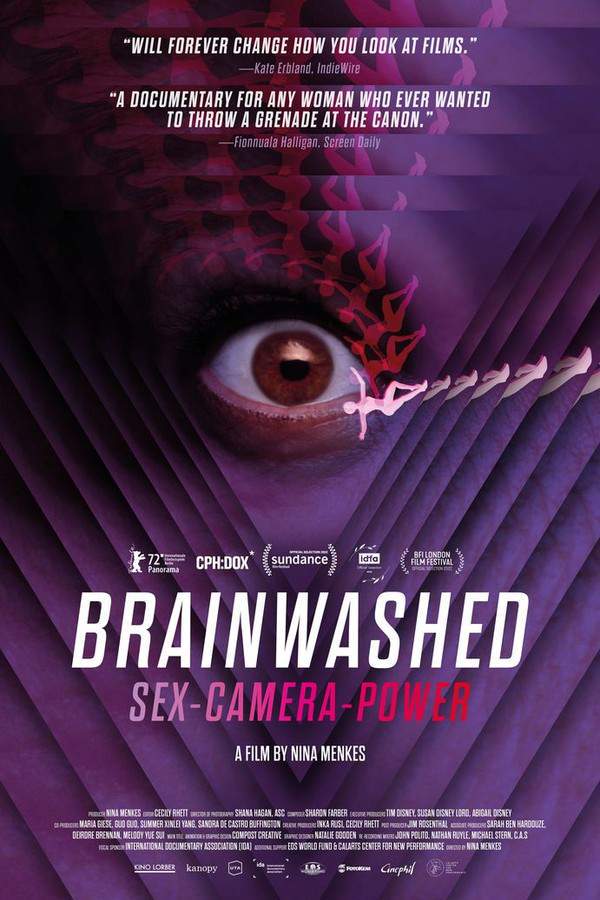
Brainwashed: Sex-Camera-Power 2022
Made by

Kino Lorber
Test your knowledge of Brainwashed: Sex-Camera-Power with our quiz!
Brainwashed: Sex-Camera-Power Plot Summary
Read the complete plot summary and ending explained for Brainwashed: Sex-Camera-Power (2022). From turning points to emotional moments, uncover what really happened and why it matters.
“Startling and thought-provoking, Brainwashed is poised to transform how audiences perceive film. As noted by IndieWire, it inspires not only a fresh way of looking but also a revolutionary approach to seeing.”
For decades, feminist film theorists have delved into the complexities and consequences of the “male gaze.” Initially coined in 1975 by Laura Mulvey—who appears as a pivotal interviewee in Brainwashed—the discussion remains relevant as ever, with the hashtag #malegaze amassing over 300 million views on TikTok. Lena Wilson, a film reviewer for Playlist and TikTok, emphasizes the film’s urgent message: “You may think that on-screen sexism is a thing of the past, or that it can’t possibly affect our society… Menkes is here to tell you, emphatically, that you are wrong.”
Brainwashed builds on the foundational work of Mulvey alongside other prominent feminist thinkers such as Judith Butler, bell hooks, and Angela Carter. Through a combination of interviews with 21 distinguished women and nonbinary experts (and even one man!), along with nearly 200 iconic film clips dating from 1896 to the present, independent filmmaker Nina Menkes meticulously uncovers how elements of shot design—including POV, framing, camera movement, lighting, and sound—have ingrained the sexist binary within cinematic history. The film adeptly links these gendered “laws” of visual language to the pervasive issues of sexual harassment and assault, as well as gender discrimination in the workplace.
By deconstructing societal perceptions of who women are versus the identities they are permitted to embody, Brainwashed equips viewers with the necessary tools to challenge their understanding of traditional filmmaking and its profound repercussions in real life.
Brainwashed: Sex-Camera-Power Timeline
Follow the complete movie timeline of Brainwashed: Sex-Camera-Power (2022) with every major event in chronological order. Great for understanding complex plots and story progression.
Introduction of the Male Gaze
The term 'male gaze' was first introduced by feminist film theorist Laura Mulvey in 1975. This concept examines how film tends to be shot from a male perspective, objectifying women in the process and influencing societal norms regarding gender roles.
Laura Mulvey's Contribution
In *Brainwashed*, Laura Mulvey features prominently as a critical voice in the dialogue about gender representation in film. Her insights and research are pivotal to understanding the historical context and implications of the male gaze in cinema.
The Emergence of Feminist Film Theory
Since Mulvey's initial theories, feminist film theorists like Judith Butler and bell hooks have continued to explore how film reflects and perpetuates societal gender biases. Their contributions deepen the discourse surrounding the representation of women in media.
Rise of the #MaleGaze Movement
The hashtag #malegaze gained traction on TikTok, amassing over 300 million views. This movement reflects a growing awareness and criticism of how cinematic narratives shape our perceptions of gender and power dynamics.
Nina Menkes' Vision
Independent filmmaker Nina Menkes directs *Brainwashed*, using it as a platform to challenge traditional filmmaking practices. She seeks to illuminate the ingrained biases within the cinematic language that affect societal views on women.
Interviews with Experts
*Brainwashed* includes interviews with 21 distinguished women and nonbinary experts, as well as one male voice. These interviews provide diverse perspectives on the effects of cinematic representation and contribute to a rich dialogue on the subject.
Incorporation of Film Clips
The film features nearly 200 iconic film clips dating as far back as 1896. This extensive archive serves as evidence of the persistent application of the male gaze throughout cinematic history, allowing audiences to see patterns and legacy in visual storytelling.
Deconstructing Shot Design
Menkes meticulously analyzes shot design elements such as framing, camera movement, and sound. This analysis uncovers how these technical decisions have historically reinforced gender stereotypes and societal expectations of women.
Linking Visual Language and Social Issues
*Brainwashed* effectively connects the “laws” of visual language to real-world problems like sexual harassment and gender discrimination. The film argues that the way women are depicted in cinema is inherently tied to systemic societal issues.
Challenging Perceptions
By deconstructing societal images of women, *Brainwashed* equips viewers with the tools needed to rethink traditional filmmaking. This critical perspective aims to encourage audiences to question and challenge the narratives they consume in media.
Impact on Audience Consciousness
The provocative insights shared in *Brainwashed* are designed to transform how audiences perceive film and its implications. It encourages viewers to engage more critically with the material presented and reflect on their own viewing habits.
Feminist Film Theory's Relevance Today
The exploration of the male gaze is more relevant than ever in today's cultural climate. Through its discussions and findings, *Brainwashed* highlights the ongoing need to advocate for equitable representation within the film industry.
Encouragement of Future Dialogues
By showcasing critical voices and research, *Brainwashed* aims to foster further discussions on gender representation in film. The film serves as a call to action for filmmakers and audiences alike to be more conscious of the narratives they support.
Conclusion and Call to Action
In its conclusion, *Brainwashed* emphasizes the importance of awareness in combating the ingrained biases that have dominated film for decades. It urges viewers to actively challenge these norms and support diverse representations in cinema.
Brainwashed: Sex-Camera-Power Settings
Learn where and when Brainwashed: Sex-Camera-Power (2022) takes place. Explore the film’s settings, era, and how they shape the narrative.
Time period
1896 to present
The film spans a significant time frame from 1896 to the present, highlighting the evolution of cinematic techniques and the portrayal of women in film. This period marks advancements in film technology and changes in societal attitudes towards gender and sexuality, reflecting how they have intertwined throughout history.
Brainwashed: Sex-Camera-Power Themes
Discover the main themes in Brainwashed: Sex-Camera-Power (2022). Analyze the deeper meanings, emotional layers, and social commentary behind the film.
👁️
Male Gaze
The theme of the 'male gaze' underpins the film, illustrating how women's representation in film has historically been crafted through a male perspective. This theme challenges viewers to recognize the impact this has on societal norms and expectations regarding gender, sexuality, and power dynamics within the film industry.
⚖️
Gender Discrimination
The film addresses the ongoing issues of gender discrimination, making connections to workplace harassment and societal inequalities. By spotlighting the narratives of various women and nonbinary individuals, it seeks to raise awareness about the biases ingrained in visual storytelling and the real-world consequences of these portrayals.
🎥
Cinematic History
Through its exploration of nearly 200 iconic film clips, *Brainwashed* delves into cinematic history to reveal how certain shot designs and techniques perpetuate gender stereotypes. This theme encourages audiences to reconsider the storytelling methods employed in films and their societal implications.

Coming soon on iOS and Android
The Plot Explained Mobile App
From blockbusters to hidden gems — dive into movie stories anytime, anywhere. Save your favorites, discover plots faster, and never miss a twist again.
Sign up to be the first to know when we launch. Your email stays private — always.
Brainwashed: Sex-Camera-Power Spoiler-Free Summary
Discover the spoiler-free summary of Brainwashed: Sex-Camera-Power (2022). Get a concise overview without any spoilers.
In a world where every frame can whisper a hidden bias, Nina Menkes steps behind the camera not to direct a story, but to unravel the language that has long spoken for it. As a filmmaker and relentless investigator, she invites the audience to peer through the same lenses that have shaped our cultural imagination for more than a century. The documentary’s premise is simple yet daring: to expose how the very mechanics of shooting—angle, movement, lighting, and sound—have been enlisted to objectify women and cement a patriarchal visual code.
The film’s canvas is the silver‑screen itself, stitched together from nearly two hundred iconic clips that span from the silent era of 1896 to today’s blockbusters. Interwoven with these images are fresh testimonies from scholars and industry veterans, including Laura Mulvey, whose pioneering theory of the “male gaze” provides a cornerstone for the discussion. Their combined insights turn each historic scene into a case study, showing how subtle choices in composition can reinforce gendered power dynamics without a word of dialogue.
Tone-wise, the documentary balances scholarly rigor with a palpable urgency. Its voice is both analytical and impassioned, echoing the contemporary roar of social‑media conversations while grounding them in cinematic history. Viewers are guided through a maze of visual tropes that feel at once familiar and unsettling, prompting an instinctive re‑evaluation of what they have always taken for granted when watching a film. The mood is as much about revelation as it is about empowerment—suggesting that understanding the grammar of the gaze can be the first step toward dismantling it.
Through a mosaic of interviews, expert commentary, and meticulous visual breakdowns, Brainwashed crafts an immersive experience that feels more like a collaborative investigation than a conventional documentary. The dynamic between Nina Menkes and her diverse panel of voices creates a dialogue that is both intimate and expansive, offering viewers a toolkit to question not only the images on screen but the broader societal scripts they reinforce.
Can’t find your movie? Request a summary here.
Featured on this page

What's After the Movie?
Not sure whether to stay after the credits? Find out!
Explore Our Movie Platform
New Movie Releases (2025)
Famous Movie Actors
Top Film Production Studios
Movie Plot Summaries & Endings
Major Movie Awards & Winners
Best Concert Films & Music Documentaries
Movie Collections and Curated Lists
© 2025 What's After the Movie. All rights reserved.





